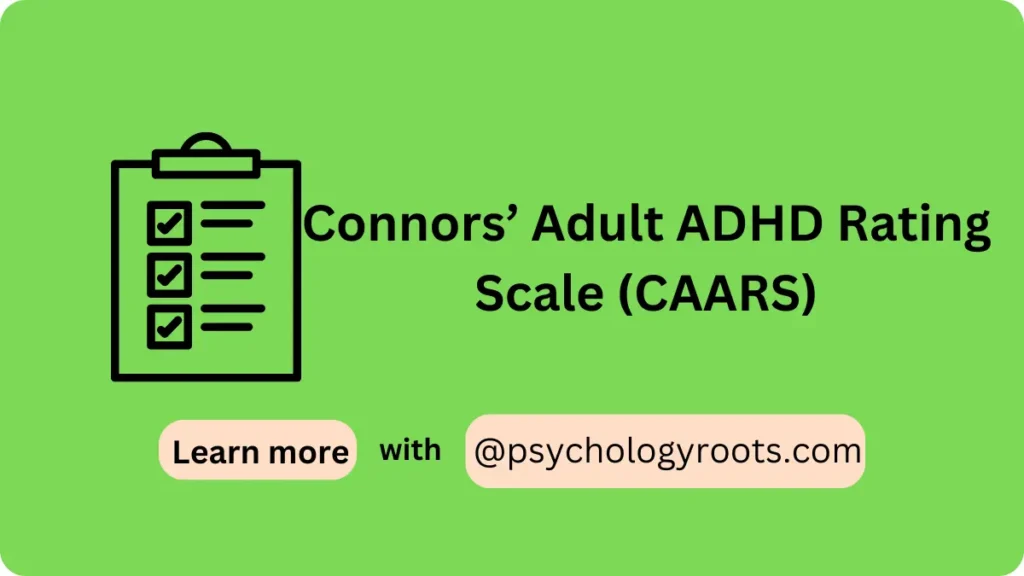Table of Contents
Connors’ Adult ADHD Rating Scale (CAARS)
Here in this post, we are sharing the “Connors’ Adult ADHD Rating Scale (CAARS)”. You can read psychometric and Author information. We have thousands of Scales and questionnaires in our collection (See Scales and Questionnaires). You can demand us any scale and questionnaires related to psychology through our community, and we will provide you with a short time. Keep visiting Psychology Roots.
About Connors’ Adult ADHD Rating Scale (CAARS)
Scale Name
Connors’ Adult ADHD Rating Scale (CAARS)
Author Details
Conners, C. K., Erhardt, D., & Sparrow, E.
Translation Availability
Not sure

Background/Description
The Connors’ Adult ADHD Rating Scale (CAARS) is a comprehensive assessment tool designed to evaluate symptoms of Attention Deficit Hyperactivity Disorder (ADHD) in adults. Developed by C. Keith Conners, David Erhardt, and Elizabeth Sparrow, the CAARS provides a reliable and valid measure of ADHD-related behaviors in adults, addressing a critical need for adult-specific ADHD diagnostics.
ADHD is often associated with children, but it persists into adulthood for many individuals, affecting various aspects of life, including work, relationships, and daily functioning. The CAARS was developed to capture the unique manifestations of ADHD in adults, which can differ from those observed in children.
The CAARS includes both self-report and observer-report forms, allowing for a comprehensive evaluation from multiple perspectives. The scale assesses a broad range of symptoms and behaviors associated with ADHD, including inattention, hyperactivity, impulsivity, and related emotional and behavioral challenges. The CAARS is widely used in clinical settings, research, and as part of a comprehensive assessment for diagnosing adult ADHD.
Administration, Scoring and Interpretation
- Participant Selection: The CAARS is intended for adults aged 18 and older who are being evaluated for ADHD. It can be used in clinical settings, research studies, or as part of a broader psychological assessment.
- Scale Distribution: The CAARS is available in both self-report and observer-report formats. Participants or observers (e.g., family members, clinicians) complete the questionnaire, which can be administered in paper form or electronically.
- Response Format: The CAARS consists of a series of statements related to ADHD symptoms and behaviors. Participants rate each item on a Likert scale, typically ranging from 0 (not at all/never) to 3 (very much/very frequently), based on the frequency and severity of the symptoms over the past month.
- Scoring: The CAARS includes several subscales that correspond to different aspects of ADHD, such as inattention/memory problems, hyperactivity/restlessness, impulsivity/emotional lability, and problems with self-concept. Scores are calculated for each subscale, and a total ADHD index score is derived. High scores on the ADHD index and related subscales indicate a greater likelihood of ADHD.
Reliability and Validity
The Connors’ Adult ADHD Rating Scale has demonstrated strong reliability and validity across numerous studies. The CAARS shows high internal consistency, with Cronbach’s alpha values typically exceeding 0.80 for the various subscales.
The validity of the CAARS is supported by its ability to distinguish between individuals with and without ADHD, as well as its strong correlations with other measures of ADHD and related constructs, such as executive functioning, anxiety, and depression. The CAARS is also sensitive to treatment effects, making it useful for monitoring changes in symptoms over time.
Available Versions
Multiple-Items
Reference
Connors, C. K., Erhard, D., & Sparrow, D. (1999). CAARS Adult ADHD Rating Scale.
Important Link
Scale File:
Frequently Asked Questions
Q: What is the purpose of the Connors’ Adult ADHD Rating Scale (CAARS)?
A: The CAARS is designed to assess symptoms of ADHD in adults, providing a reliable measure of inattention, hyperactivity, impulsivity, and related behaviors.
Q: Who can use the CAARS?
A: The CAARS is intended for use with adults aged 18 and older who are being evaluated for ADHD. It is used by clinicians, researchers, and other mental health professionals.
Q: What types of CAARS forms are available?
A: The CAARS includes self-report and observer-report forms, allowing for comprehensive assessment from multiple perspectives.
Q: How is the CAARS scored?
A: The CAARS is scored based on responses to various subscales that correspond to different ADHD-related behaviors. A total ADHD index score is also derived to assess overall symptom severity.
Q: How reliable and valid is the CAARS?
A: The CAARS has demonstrated strong reliability and validity, making it a trusted tool for assessing ADHD in adults across clinical and research settings.
Disclaimer
Please note that Psychology Roots does not have the right to grant permission for the use of any psychological scales or assessments listed on its website. To use any scale or assessment, you must obtain permission directly from the author or translator of the tool. Psychology Roots provides information about various tools and their administration procedures, but it is your responsibility to obtain proper permissions before using any scale or assessment. If you need further information about an author’s contact details, please submit a query to the Psychology Roots team.
Help Us Improve This Article
Have you discovered an inaccuracy? We put out great effort to give accurate and scientifically trustworthy information to our readers. Please notify us if you discover any typographical or grammatical errors.
Make a comment. We acknowledge and appreciate your efforts.
Share With Us
If you have any scale or any material related to psychology kindly share it with us at psychologyroots@gmail.com. We help others on behalf of you.